Acetylcholine is a neurotransmitter that’s essential for cognitive function. Your brain uses it to transmit, process, and modulate information during cognitive processing, and naturally, that’s led to investigation into the use of acetylcholine as a nootropic supplement to improve cognitive function.
However, you can’t absorb acetylcholine in supplement form; you need to take supplements that boost acetylcholine levels indirectly, either by providing the precursors for synthesizing it, or slowing the breakdown of acetylcholine in your brain.
With these, you may be able to improve memory, attention, and learning beyond what’s possible for you normally. Looking for better brain power?
Here are the best nootropic supplements to boost your acetylcholine levels, according to our research team.
Research
Rankings
1. Optimind
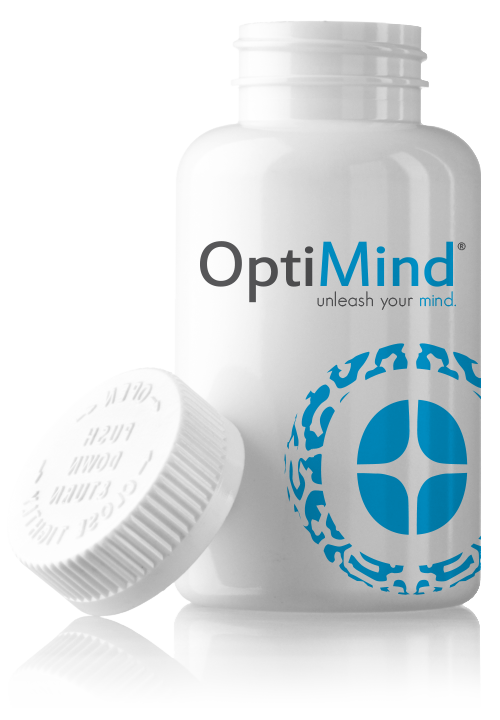
If you want to enhance your cognitive function, focus, and memory, as well as receive countless other benefits, then Optimind is the supplement for you.
Based on more than 50 years of neuroscience it offers a powerful triple-threat of ingredients to boost your acetylcholine levels.
- Bacopa monnieri, an herb that has been used medicinally for thousands of years
- Vinpocetine which is extracted from the periwinkle plant to benefit your memory
- Sulbutiamine, a synthesized ingredient which increases your energy as well as your acetylcholine levels
Optimind then slows the breakdown of acetylcholine, ensuring that it stays in your body longer, so you get the most out of it. For that it uses Huperzine A, an ingredient extracted from plants and used to treat people with Alzheimer’s.
And this is only the tip of the iceberg. Every ingredient in Optimind is specifically chosen to ensure that your mind is running at its best, boosting your focus, sleep, energy, and health.
You’re not going to find a more complete and effective nootropic anywhere else. That’s why it’s our number one pick.
2. Cognitune NuClarity
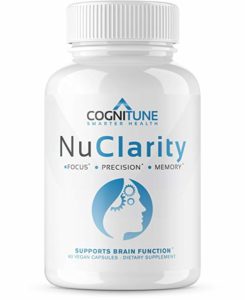
Cognitune NuClarity is one of the few nootropic supplements that provides three of the major supplements for maintaining consistently high acetylcholine levels.
It uses alpha GPC, a precursor and building block for acetylcholine, to increase the rate of synthesis, as well as phosphatidylserine to stimulate the release of acetylcholine.
Finally, huperzine A ensures that the acetylcholine that is synthesized and released is degraded more slowly. Because it bolsters all three pillars of high acetylcholine levels. We highly recommend it.
3. Genius Consciousness
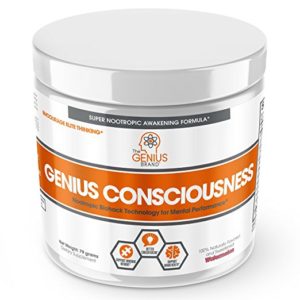
Genius Consciousness includes several compounds to help boost acetylcholine levels in your brain.
These include alpha-GPC, which serves as a precursor for acetylcholine synthesis, and huperzine A, which slows the deterioration of acetylcholine once it’s been synthesized.
This double-edged approach makes Genius Consciousness particularly effective at improving memory and learning.
In addition to the acetylcholine promoting compounds, you’ll also find a slew of other nootropic compounds, which makes it a well-rounded supplement for cognitive function overall, too.
4. Onnit Alpha Brain
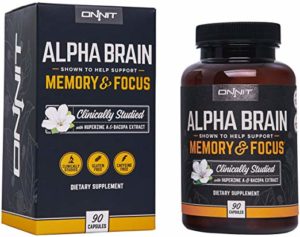
Onnit’s Alpha Brain is a nootropic supplement that’s formulated to stimulate cognitive performance on several fronts at once, but it definitely holds its own when it comes to acetylcholine production.
It includes both alpha GPC and huperzine A, so you’ll get a boost in acetylcholine synthesis and a decrease in acetylcholine degradation as well, which will pave the way to sustained improvements in memory and cognitive functioning.
Unlike many of its competitors, Alpha Brain doesn’t include caffeine, so it’s well-suited for use at any time of day, and by people who are too sensitive to use caffeine-based cognitive enhancement supplements.
5. Zhou Neuro Peak
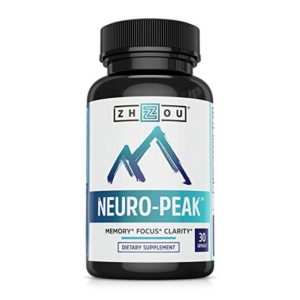
Zhou Neuro Peak has a number of nootropic ingredients, and is widely applauded for its efficacy. In terms of its acetylcholine effects, the primary ingredient of importance is phosphatidylserine.
Scientific research has documented that this compound can stimulate the direct release of acetylcholine into the brain, which makes supplements that include it, like Zhou Neuro Peak, good for a rapid boost in acetylcholine levels for intensive studying or work sessions.
6. Doctor’s Best Natural Brain Enhancers
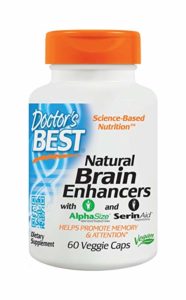
Doctor’s Best provides a great supplement that specifically targets acetylcholine production and release.
Its Natural Brain Enhancers supplement uses alpha GPC in combination with phosphatidylserine, a compound that induces the release of acetylcholine into the brain.
The two in combination may help prevent acetylcholine depletion from phosphatidylserine alone, as the alpha GPC serves as a precursor to synthesize more acetylcholine. To directly boost acetylcholine levels without other nootropic compounds, this supplement is one of the best.
7. 1 Body Brain Support
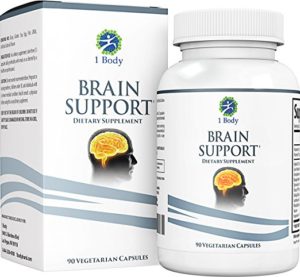
1 Body Brain Support has both alpha GPC and huperzine A to boost the synthesis of acetylcholine and reduce its rate of resorption, but it does also contain quite a long list of additional ingredients.
These could prove to be a problem if you’re sensitive to side effects, or if you are more interested in acetylcholine production and less in overall nootropic effects.
This is a necessary tradeoff with any supplement that aims to provide nootropic effects with a wide range of ingredients versus targeting a specific pathway (e.g. acetylcholine production).
8. Nooflux Axon
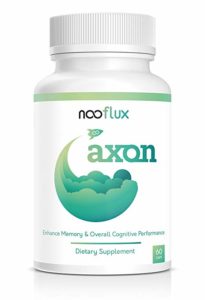
Nooflux Axon uses a slightly different approach from many of its competitors. It focuses on boosting acetylcholine synthesis with CDP choline, a slightly less common precursor.
It does include phosphatidylserine to accelerate the release of acetylcholine as well. This combination might be a good choice if other acetylcholine supplements haven’t worked as well as you’d like.
9. Arazo Nutrition Brain Plus
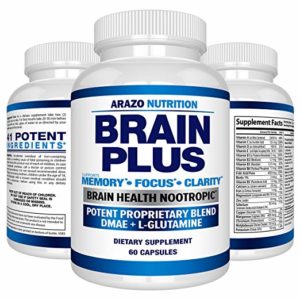
Though Arazo Nutrition Brain Plus is one of the most popular nootropic supplements on the market right now, it has a number of drawbacks related to its acetylcholine producing ability that make it less well-suited for this application.
First among these is the fact that, while it contains huperzine A, choline, and phosphatidylserine, these are included among many other ingredients in a proprietary blend, which makes it difficult to tell whether they are present in adequate amounts.
It’s a decent general-purpose nootropic, but for acetylcholine specifically, it’s not the best.
10. Neuro Matrix
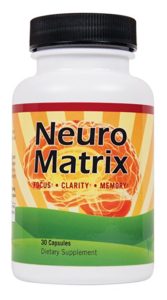
Neuro Matrix uses phosphatidylserine and huperzine A as its primary acetylcholine boosting ingredients, though the levels of these compounds are somewhat less than in other supplements.
It’s less proven than other general nootropics, and this combined with its lower acetylcholine boosting activity relegates it to a lower position in the rankings.
Category winners
Best acetylcholine overall: Optimind
Optimind is our favorite all-purpose supplement for boosting acetylcholine levels thanks to the broad range of ingredients supporting all aspects of cognitive function. You get compounds that boost acetylcholine synthesis and slow acetylcholine degradation, plus other nootropics like caffeine and GABA to support all-around brain functioning.
Best acetylcholine for memory: Genius Consciousness
Genius Consciousness supports memory function both through its acetylcholine stimulants and the inclusion of other compounds with independent effects on cognitive function like Lion’s Mane mushroom and coffee fruit extract. For better memorization and memory recall, this is the nootropic we recommend.
Best acetylcholine for sleep: Cognitune NuClarity
A lot of learning happens when you’re asleep, and for this purpose we recommend Cognitune NuClarity. It is designed to augment neurotransmitter levels while remaining caffeine-free to support better brain function even while you’re asleep.
Best acetylcholine for cognitive function: Optimind
For performing well on cognitive tasks, Optimind is an excellent pick. It supports acetylcholine levels in the brain while also supplying general-purpose nootropics like B-complex vitamins, caffeine, and vinpocetine. For studying, intensive projects, and other cognitively demanding tasks, it’s our recommended pick.
Best acetylcholine for older adults: Cognitune NuClarity
For older adults looking to use acetylcholine to support brain function over the long-term, Cognitune NuClarity is our pick thanks to its caffeine-free formulation that provides precursors to acetylcholine plus compounds to boost its synthesis rate and slow its degradation rate.
Best acetylcholine for mood support: Cognitune NuClarity
Cognitune’s formulation is a solid choice if you’re looking for an acetylcholine supplement to fight feelings of depression and anxiety. It contains a broad range of ingredients to support the synthesis of neurotransmitters, and is also caffeine-free: though caffeine is a powerful nootropic, it can be counterproductive for fighting anxiety.
Who should buy acetylcholine?
Acetylcholine is safe for most individuals and can help protect the brain against neurodegenerative diseases. It has also been shown to improve cognitive functioning, making it a great choice for students and executives.
While most acetylcholine boosting ingredients don’t tend to interact severely with medications, you should speak to your doctor before taking an acetylcholine supplement, if you are currently taking any prescription medication.
How we ranked
Acetylcholine is not directly supplemented with, which made our rankings much more difficult. As such, we focused on high-quality ingredients that helped boost acetylcholine formation in the brain. We specifically looked for products that included ingredients like alpha-GPC and huperzine A, which actively improve acetylcholine levels, while also slowing the breakdown of it in the brain. This is why we ranked products like Alpha Brain and Genius Consciousness well.
We also rewarded products like Cognitude that included phosphatidylserine since it helps to further stimulate the release of acetylcholine.
Supporting ingredients were also imprint to consider. Our top pick, Optimind, provides scientifically validated ingredients like Bacopa and Vinpocetine alongside the standard acetylcholine boosting ingredient to further help improve cognition and memory.
Lastly, we analyzed purity and safety. Companies that provided third-party lab testing results readily were rewarded, while those that didn’t were penalized. Furthermore, cellulose capsules were preferred as they contained fewer allergens and allowed for more people to take the product. We ranked products in our top 5, like Zhou Peak, that provided minimal to no fillers alongside clinically effective dosages of acetylcholine boosting ingredients.
Benefits
Precursors of acetylcholine show protective effects against neurodegenerative diseases like dementia. Given that acetylcholine is critically important for memory and learning, a tremendous amount of research has been devoted to studying compounds related to acetylcholine production as treatments for degenerative diseases of the central nervous system, like Parkinson’s disease and Alzheimer’s disease.
A scientific review article published in the Journal of Experimental Pharmacology by researchers in Italy summarized the effects of acetylcholine-modulating medications and supplements as they relate to cognitive decline (1).
Precursors to acetylcholine, like alpha GPC and choline, appear to confer a strong neuroprotective effect, offering resistance to cognitive decline.
Because the proposed mechanism of action is a direct increase in acetylcholine levels in the brain, other compounds that also increase acetylcholine, like huperzine A, should confer similar protective effects.
Reduced levels of acetylcholine are directly associated with decreases in cognitive performance. The central role of acetylcholine in mental function has been well-demonstrated in studies in both animals and humans that link lower levels of acetylcholine to worse cognitive function.
A study published in 1996 in the British Journal of Pharmacology used a targeted compound to block acetylcholine release in rats, and linked this decrease in acetylcholine levels to a drop in cognitive performance (evaluated, in this case, by tests like maze navigation) (2).
A study published in 2006 in the journal of Nutrition Health and Aging used folate deficiency in mice to further demonstrate that lower acetylcholine levels were linked to worse cognitive performance (3).
Both dietary factors (deficiencies in vitamin B intake) and genetic factors can lead to folate deficiency, but the authors found that, regardless of the cause of the deficiency, lower acetylcholine came hand in hand with worse cognitive performance.
The implications here are clear: higher acetylcholine levels may increase cognitive performance, hence the popularity of acetylcholine-boosting supplements among nootropic enthusiasts. Could this be the case?
Acetylcholine precursors can increase cognitive function. So far, the highest-quality research has focused mostly on people who already have some type of disease associated with cognitive decline, but still, initial results are promising.
One clinical trial published in the journal Pharmacology Biochemistry and Behavior used patients with a specific type of Alzheimer’s to demonstrate that an acetylcholine precursor (citicoline) administered at a dose of 1000 mg per day was able to improve cognitive function and increase objective measures of brain activity (4).
While this is great news, it’s hard to make a direct inference as to how much a healthy person with normal cognitive function can expect to improve: it could be more or less, depending on exactly how acetylcholine regulates cognitive performance.
Huperzine A can maintain acetylcholine levels and cognitive performance by preventing the degradation of acetylcholine. One of the limiting factors of acetylcholine levels in the brain is the rate at which this neurotransmitter is degraded by an enzyme called cholinesterase.
Many pharmaceutical drugs that target acetylcholine levels attempt to inhibit or slow the action of this enzyme. Huperzine A is one supplement that appears to do so in a safe and effective way, according to a 2006 study by researchers in China (5).
This study summarizes the uses of huperzine A as way to prolong the life of acetylcholine in the brain, and cites a number of studies in animals that show that huperzine A is linked to superior cognitive performance by way of higher acetylcholine levels.
Interestingly, huperzine A also appears to be an effective thermogenic agent assisting with fat loss, so its biological activity is not limited to the brain.
The release of acetylcholine can be stimulated by phosphatidylserine. So far, we’ve seen two ways to increase levels of acetylcholine in the brain: the first was providing the body with precursors to synthesize acetylcholine from scratch, like alpha GPC or choline.
The second was to use huperzine A to prolong the lifetime of acetylcholine in the brain. Additional research suggests that a compound called phosphatidylserine can prompt your brain to release more acetylcholine that it’s already synthesized. This was first confirmed in animal studies, and later followed up with human research (6, 7).
This suggests that there are three distinct strategies that can be used to sustain high levels of acetylcholine for superior cognitive function.
Side effects
One challenge with supplements designed to boost acetylcholine levels is that many have not been studied in large clinical trials, so their side effect profile is not well-characterized.
Huperzine A is one exception to this; several studies in China have examined it as a potential treatment for neurodegenerative diseases.
One review summarized the adverse effects from six different clinical trials; it concluded that huperzine A, while a beneficial treatment for neurodegenerative diseases, does have a tendency to cause side effects linked to high acetylcholine levels (8).
This includes nausea, hyper-excitability, vomiting, insomnia, a poor appetite, and dizziness. Since these are linked to the acetylcholine modulating effects of huperzine A, it’s likely that these side effects may also apply to the other methods of increasing acetylcholine levels, though perhaps to a lesser extent.
As with most side effects, these are less likely at lower doses, so it makes sense to start small when attempting to increase your acetylcholine levels.
Recommended dose
The optimal dose of compounds intended to boost acetylcholine levels depends widely on the compound in question.
Research on acetylcholine precursors like choline uses dosages up to 1000 mg per day (for choline) and 600 mg per day (for alpha GPC); in contrast, most research on huperzine A uses much smaller doses (0.3 to 0.4 mg per day).
For best results with minimal side effects, you should start with fractions of these dosage levels, if possible, and scale up to full research-grade dosages if you feel you need a higher dose to get optimal cognitive benefits, and if you tolerate the supplement well.
Since these supplements, when they work, do modulate levels of a core neurotransmitter, you’ll want to be deliberate in your supplementation routine.
FAQ
Why isn’t acetylcholine sold as a supplement? While you can’t directly take acetylcholine as a supplement, there are supplements that you can take that increase the levels of acetylcholine in your brain indirectly. These either promote the production of acetylcholine, stimulate its release, or prevent released acetylcholine from being degraded over time.
The effects of all of these are functionally the same as the effects of a heightened level of acetylcholine; namely, a range of cognitive, nootropic, and and neuroprotective effects.
What is acetylcholine? Acetylcholine is a neurotransmitter, which are chemical messengers that help your body communicate commands and gather information (9).
As an ester (or organic compound) of acetic acid and choline, acetylcholine helps transmit nerve pulses throughout the body. It’s stored in the ends of acetylcholine-producing neurons throughout the nervous system, in little compartments called vesicles.
Why is acetylcholine important? Acetylcholine, once released, binds with acetylcholine receptors in the nervous system to allow the flow of calcium and sodium ions. These ions enable the nervous system to send orders to contract muscles.
Acetylcholine is a key player in the peripheral nervous system, which regulates voluntary muscle activity. It’s also crucial in the autonomic nervous system, which regulates many of the body’s involuntary processes and helps to maintain the body’s homeostasis.
By working in the sympathetic and parasympathetic branches of the autonomic nervous system, acetylcholine helps open these ion gates and deliver crucial messages (10). This helps dilate blood vessels, slow heart rate, regulate bodily secretions, and contract smooth muscles (smooth muscles occur in our internal organs and are not under our voluntary control).
Acetylcholine also impacts the respiratory system, modulates bladder activity, and helps to manage peristalsis, which is the rhythmic constriction and relaxation of digestive channels. It’s crucial in helping your body maximize its nutritional gain from food.
However, acetylcholine doesn’t just play important roles in muscle contraction or involuntary bodily processes. It also helps to coordinate the response networks in diverse areas of the brain, making it a key mechanism in both simple and complex human functions and behaviors. As such, acetylcholine is crucial in numerous arenas of bodily functioning and human behavior (11).
What happens when you don’t have enough acetylcholine? Among Alzheimer’s patients, both the quantity and function of acetylcholine decrease. The reduction of neural synapse activity is correlated with the progression of Alzheimer’s.
Decreased acetylcholine production is also associated with attention deficits and loss of memory, both in Alzheimer’s patients and in other populations. Currently, researchers are investigating the role of acetylcholine-based treatments in Alzheimer’s patients (12).
For these reasons, some studies suggest that acetylcholine supplementation can help prevent motor dysfunction or advanced cognitive decline, especially later in life (13). Acetylcholine supplementation may prove to become a key agent in promoting long-term cognitive health.
How does acetylcholine impact learning and memory? Acetylcholine helps to regulate a wide array of complex behaviors, especially involuntary ones. However, one study points to how acetylcholine helps to modulate and modify nerve synapses during learning and memory encoding (14). Without acetylcholine, many learning processes, short-term memory encoding, and long-term memory encoding just would not function in the same way.
Because of the wide variety of roles that acetylcholine plays, many scientists believe it’s a huge player in the fields of haptic memory and haptic knowledge. If “haptic” means related to touch or proprioception, haptic memory and knowledge operate as the points where cognitive memory, learning, and knowledge converge with involuntary bodily processes.
Acetylcholine even plays a crucial role in forming and regulating olfactory perceptual learning. In other words, if you’ve ever formed memories around smells, acetylcholine was a huge player in linking the smells with other sense memories in your brain (15).
How does nicotine intake affect acetylcholine? Some acetylcholine receptors are nicotinic receptors. One study demonstrated that nicotinic acetylcholine receptors grow denser in the case of nicotine addiction (16). This further serves to demonstrate the importance of acetylcholine in memory, knowledge, learning, involuntary bodily processes, and habits.
What is choline, and why is it important in acetylcholine supplements? As one of the two precursors of acetylcholine, your body needs choline in order to synthesize this crucial neurotransmitter. It also contributes to rebuilding cellular structure in the body, plays a role in fetal brain and memory development, and may also be important in protecting against liver disease.
For these reasons, it’s been recognized as an essential nutrient. However, most men, women, pregnant women, and older children do not get the choline they need from their daily diet. For older adults, in particular, ingesting enough choline in their diet may be crucial to maintaining brain function over their lifespans (17).
Which groups of people need more choline than others, and can acetylcholine supplements help? Infants and children require more choline relative to body weight than adults because choline is necessary for brain development, early learning, and growing organ tissue.
Choline supply during pregnancy is vital for fetal brain and neural development and for the prevention of neural tube disorder (18). As such, acetylcholine supplements may provide much-need acetic acid and choline to pregnant women.
How much choline do most people get, and how much should they be getting for acetylcholine production in the body? The IOM-recommended daily choline intake to support healthy acetylcholine production is 425 mg for women, 450 mg for pregnant women, and 500 mg for men. Despite this fact, many individuals only obtain 200-400 mg of choline per day (19).
Can acetylcholine supplements help improve mood? If you’ve experienced memory problems, poor focus, or mood instability linked to acetylcholine deficiencies, an acetylcholine supplement may help you improve your overall mood and mental well-being.
Is acetylcholine linked to heart health? According to one study, acetylcholine is crucial for maintaining homeostasis in the heart (20).
The heart’s activity is regulated, in part, by both the sympathetic and parasympathetic branches of the Autonomic Nervous System or ANS. As a neurotransmitter, acetylcholine acts as a signal-bearing “gatekeeper” to neurons that help to slow your heartbeat, especially after strenuous activity. It also helps to carry nerve signals from your brain to your heart continuously.
Due to the recent rise in acetylcholine research, some scientists are now considering how acetylcholine might be able to reduce morbidity and mortality in patients with cardiac disease. The more researchers learn about the role of acetylcholine in the body, the more they suspect that acetylcholine can promote positive cardiac functions, as well as help to alleviate cardiac disease.
Do I need an acetylcholine supplement? Both acetic acid and choline – the precursors for acetylcholine – are found in an everyday diet. Unfortunately, many diets are lacking in choline, acetic acid, or both. Choline serves a number of crucial roles throughout the body, while acetic acid, in addition to being a precursor of acetylcholine, may also help reduce cholesterol (21).
In some cases, external factors increase the body’s demand for choline or acetic acid. Other dietary deficiencies, such as a folate or vitamin B12 deficiency, can further increase the body’s need for choline (22).
Endurance athletes may also experience an increased need for choline, since long periods of strenuous activity can decrease the body’s circulating choline stores. Acetylcholine supplementation may help protect the body against the disease and support overall well-being. Always talk to your healthcare provider before changing your wellness supplementation routine.
Can acetylcholine supplements help me lose weight? Choline is present in acetylcholine, and according to one study, choline supplementation can help support weight loss without any side effects for overall physical strength. This makes it a popular supplement choice in some competition taekwondo and judo circles (23).
What’s in acetylcholine supplements? Acetylcholine supplements do not contain the acetylcholine neurotransmitter. Rather, they contain the precursors to acetylcholine. Acetylcholine supplements are a way of making sure your body has all the right building blocks for producing this crucial neurotransmitter.
Are acetylcholine supplements safe for everyone? Acetylcholine supplements are generally regarded as safe, and few side effects are associated with taking them. They’re regarded as useful supplements to help protect cognitive function in older adults, promote a healthy pregnancy, and encourage all-around well-being (24).
Regardless, you should consult a healthcare provider before changing your supplementation routine, especially if you take other medications or supplements. Stick to the recommended supplementation amount to remain safe.
What’s the upper limit for acetylcholine supplements? For some individuals, taking too many acetylcholine supplements may result in excessive choline intake. Daily choline intake above 3,500 mg can result in headaches, lowered blood pressure, sweating, body odor, nausea, diarrhea, and vomiting.
Steer clear of these negative effects of excessive choline by following the advice of your healthcare provider and keeping well under 3,500 mg per day. Many individuals find that a dosage of around 1,200 mg per day is conducive to improved health and well-being (25).
The other precursor of acetylcholine, acetic acid, is very difficult to consume too much of–unless you’re a strict devotee of apple cider vinegar. If you feel you may be getting too much acetic acid in your diet, contact your healthcare provider.
What’s the best way to take acetylcholine supplements? Acetylcholine supplements are best taken with food and water for maximal digestion and absorption.
When is the best time of day to take acetylcholine supplements? You can take acetylcholine supplements at any time of the day, but some users report that it makes them feel slightly sleepy. For this reason, many supplement users prefer to take acetylcholine at dinnertime.
Can I complement my acetylcholine supplementation with herbal supplements? It is possible to pair acetylcholine supplements with herbal supplements. However, consult your healthcare provider before doing so in order to make sure you’re not getting too much choline, as some herbs can promote choline circulation.
Adaptogens are popular companions for acetylcholine supplements. They’re herbs that help bring the body back to homeostasis and neither stimulate nor sedate. Some popular herbal supplements are Gotu kola, American ginseng, and Bacopa.
Gotu kola occupies the same plant family as parsley and carrots and has been traditionally used to help support mental health. American ginseng and Bacopa are also used to support mental functioning and acuity in conjunction with acetylcholine.
Related articles
Recap
Acetylcholine is a powerful neurotransmitter that’s essential for optimal cognitive function, learning, and memory. There are three ways to gain the benefits of high acetylcholine levels through supplementation: the first is to increase the availability of acetylcholine precursors using supplements like choline or alpha GPC.
The second is to slow the rate at which acetylcholine is deteriorated by enzymes, which is where huperzine A comes in. Finally, you can directly stimulate the release of acetylcholine with phosphatidylserine.
These supplements do have side effects you should be conscious of, but at proper dosages, the odds are good that you can gain the cognitive benefits and neuroprotective effects of higher acetylcholine.
For BodyNutrition’s #1 recommended acetylcholine supplement, click Optimind.